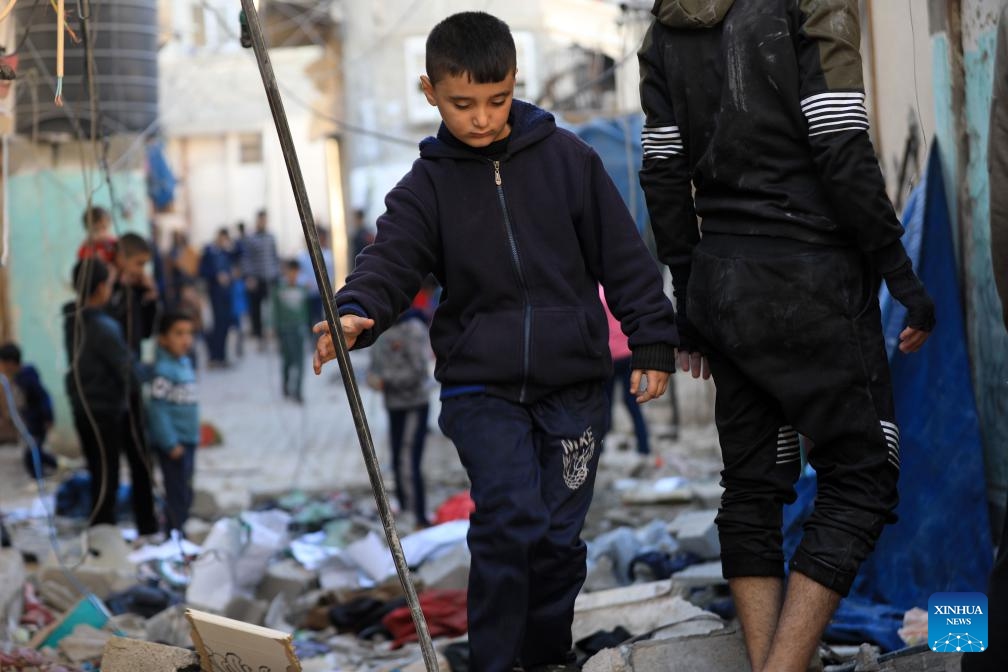Israel to partially withdraw forces from Gaza; war to enter new phase amid mounting pressures: analysts

A boy walks among the rubble after an Israeli airstrike in the southern Gaza Strip city of Rafah, on Dec. 26, 2023. At least 20,915 Palestinians have been killed, and 54,918 others wounded in the Israel-Hamas conflict since Oct. 7, the Gaza-based Health Ministry said Tuesday.(Photo: Xinhua)
Marking a notable first since hostilities began in October 2023, Israel's military announced the withdrawal of thousands of troops from the besieged Gaza Strip. Chinese analysts on Tuesday said they remain skeptical over the prospects of a cease-fire in the near future, and they argue that the move is intended to buy time for Israeli authorities to reassess the domestic repercussions of their offensive, respond to increasing pressure from their principal ally, the US, and address growing international concerns over the escalating death toll in Gaza.
Citing an unnamed Israeli official, Reuters reported on Monday that Israel is withdrawing some forces from Gaza to shift to more targeted operations against Hamas, and is partially returning reservists to civilian life to help the economy as the war looks set to last well into the new year. The official said toppling the Islamist faction remains an objective of the offensive in the Palestinian enclave, and that some of the five brigades withdrawn will prepare for a possible flare-up of a second front against Hezbollah in Lebanon.
According to analysis by Song Zhongping, a military expert and TV commentator, the Israeli military's "reconfiguration" of forces signals that Israel needs time to reassess its strategy in the Gaza region. "This includes whether it can quickly control Gaza, or face the risk of Gaza spiraling out of control again, as well as the costs of completely controlling Gaza, encompassing economic and military expenses, casualties and the rising death toll of Palestinian civilians, which brings increasingly unfavorable international public opinion pressure," Song noted.
Song told the Global Times on Tuesday that it is unlikely that Israel will shift its focus to the battlefield with Hezbollah in the northern border area, but it will continue to concentrate on military activities in the Gaza region, while taking on the Hezbollah and the Houthi group on different fronts.
Although Israel has announced a partial troop withdrawal, the possibility of a short-term cease-fire is next to zero. Israeli Prime Minister Benjamin Netanyahu needs time to contemplate how to address these issues and how to handle internal and international pressures, especially from its main ally the US, as Washington has been pressuring Israel to lower the intensity of the war, and a complete sabotage of the US' Middle East strategy due to Israel's reckless military operation is also at odds with Washington's desires, Song pointed out.
Unresolved hostage issues would significantly test Prime Minister Benjamin Netanyahu at home. Hamas is also strengthening its ability to wage a prolonged war. The convergence of Hamas with other Palestinian political factions is bad news for Israel, analysts said.
Separately on Monday, the US announced that it would be taking an aircraft carrier strike group back from the eastern Mediterranean and replacing it with an amphibious assault ship and accompanying warships, Reuters reported.
With tanks and troops having now overrun much of the Gaza Strip, largely asserting control despite Palestinian gunmen continuing their ambushes from hidden tunnels and bunkers, the military is moving to the third stage, an Israeli official, who could not be named given the sensitivity of the issue, told Reuters.
"This will take six months at least, and involve intense mopping-up missions against the terrorists. No one is talking about doves of peace being flown from Shujayea," the official was quoted as saying, referring to a Gaza district ravaged by fighting.
Chinese observers warned that such so-called mopping-up involves gradually identifying and eliminating Hamas's potential strongholds in the entire Gaza Strip. This stage could be the most challenging and time-consuming.
It would help reduce the Israel's cost of military operations and lives of soldiers, and transitioning to such an operational phase is both a subjective choice on their part and a result of being forced into it. The previous ground military operations did not meet their expectations, both in terms of progress and effectiveness, Zhu Yongbiao, executive director of the Research Center for the Belt and Road at Lanzhou University, told the Global Times on Tuesday.
On the contrary, they suffered many negative impacts and factors, possibly due to inadequate preparation. At this stage, they hope to adopt a new mode of warfare to avoid further embarrassment and unfavorable outcomes brought by large-scale ground military operations. They aim to prevent a worse outcome by being prepared and formulating strategies, Zhu noted.

